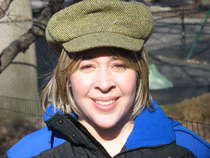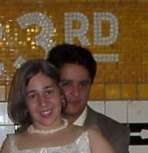 Yahoo 9/11 10th Anniversary
Yahoo 9/11 10th Anniversary9/11 widow rebuilds life with son she had month after attack

Several months after Alissa Torres's husband was killed in the World Trade Center attacks on Sept. 11, she received a small American flag in the mail. The return address was NASA. "I remember thinking, I don't know what the heck this is!"
A condolence letter was included with the flag, along with a description of how tiny fabric flags had been launched into orbit aboard space shuttle Endeavour and then delivered to the relatives of those lost on Sept. 11. "I found the actual idea and the amount of resources involved preposterous," Torres recalls. "But at the same time the sentiment was beautiful. I felt like it had summed up my life."
When Eddie Torres died he was 31 and Alissa, also 31, was seven and a half months pregnant with their first child. The couple had recently bought a home in Queens, and Eddie was starting the second day of a job he had worked tirelessly to land as a currency broker at Cantor Fitzgerald. The investment bank, located on floors 101-105 of One World Trade Center, lost two-thirds of its workforce that Tuesday morning. Eddie lost his life; Alissa lost the future she envisioned for her family.
When she received the little flag, she had a unique revelation: "My life was a comic book," she says she thought. Six years later, her cartoon-style graphic novel, "American Widow," was published by Random House's Villard Books. Alissa Torres's 210-page visual memoir begins with a drawing of a young couple arm in arm, facing downtown Manhattan. It ends with a photograph of a mother and her young son emerging from a pool of dark water. Everything that happens in between is the story of Torres's life from meeting her husband to living without him.
Alissa and Eddie met at a Manhattan nightclub in the summer of 1998. A young Colombian immigrant, toiling in low-paying odd jobs, Eddie would change his life radically after falling in love with the New Jersey-born Alissa. They bought a home, he started to climb the corporate ladder, and the couple prepared for the birth of their child. Eddie's life was the embodiment of the American dream; Alissa's life was to become a story of American grief.

Before she began her book, Alissa Torres published a series of articles on Salon.com about her experience as a Sept. 11 widow. When she decided to turn her story into a book, the decision to tell it graphically was a tough sell to publishers. "At the time, graphic novels weren't a known entity," she says. "Publishers weren't exactly excited to have a first-time writer make a graphic novel."
But Torres was steadfast and received a book deal from Villard. The biggest creative challenge, she says, was handing over a certain amount of control to an artist and editor to shape the devastating story that had begun to shape her life. On Page 198, the book's cartoon panels are replaced by a collage of real photos of Eddie Torres's life. Candid snapshots of him on vacation, him as a boy, a copy of a Brooklyn video store membership card, a World Trade Center access ID, his expired driver's license, all overlap as a scrapbook across two pages.
"The collage of my husband: Whenever I look at that page it's overwhelming," Alissa Torres says. "All these really banal moments become a compilation of everything that's left. There's no person anymore."
In the months after Eddie's death, Alissa's life became its own collage of paperwork. From FEMA, to legal strategists, to the Salvation Army and the Red Cross, her days were spent trying to obtain the support she was promised by the government, nonprofit organizations, and her husband's employer. Applications for compensation from the Red Cross led to road-blocked paper trails. By December 2001, she'd sent a letter to its headquarters, the first of many that would eventually help her navigate, what she calls in her book, "their intricate systems of 9/11 assistance."
With every step forward, she moved further away from the life she had planned with Eddie. "When my husband died, I sold the house. I eventually moved out of my neighborhood because it was too claustrophobic," she said. "Everyone knew about what had happened to me but didn't know how to relate." It was particularly hard being a new mom and having to explain to each new person she met the reason her child didn't have a father present. She briefly moved to New Jersey but returned to New York City, a place she still considers home.
After working six years on her book, Alissa Torres became a published author in 2008. By then her son, Josh, was almost 8. "He was proud of me but funny about it. I think he felt competition for my attention all of a sudden," she says.
Last fall, on a trip to San Francisco, Alissa took Josh to Angel Island, a former processing station for immigrants. It sparked a conversation about his father's history, and it was then that she realized she had mapped much of it in her book, from Eddie's pugnacious boyhood to his hours toiling in a sweatshop and his ascent up the corporate ladder. "I told him to look at the book I made, which explained it all in pictures. It was a place where he could go and learn about his dad for himself."
Now 10, Josh is good at math, which Alissa attributes to Eddie, though cautiously. "It's hard," she says. "I've known my son longer now than I knew my husband. All told, I knew Eddie for three years, and it's hard to remember everything."
When people point out the resemblance between Josh and his mom, a wave of complicated emotions emerges. "I feel uncomfortable when people say, 'He looks like you'," Alissa Torres admits. "The features of a child pop out based on whichever parent they are standing next to. So hearing that is bittersweet."
"I feel like a lot of things I'd be holding onto I can let go of now that they're in the book," she says. "When you're a victim of uncontrollable circumstances, it's important to find a creative process that lets you be the active one."
Lately, her writing is on hold as she returns to school to become a science teacher.
After the book came out, she began teaching writing through an organization called Teachers and Writers. Because of cutbacks in the arts, she didn't get much experience on the job. What she learned, though, is that she wanted to inspire kids to be creative, but in a more concrete way. The choice to embrace more "left brain" thinking came as a surprise to Alissa, who as a kid hated anything involving math.
"The humanities seem like such gray areas. I want to be more engaged in the world in a physical kind of way," she explains. "In science, there are these definite answers, which is comforting."
Share your 9/11 memories with us on Twitter - #911remembered

